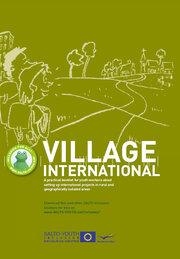Why go international with rural youth? - Benefits
If you are lucky, there might be a youth organisation in your rural area that works with rural youth. Youth organisations run many interesting and fun activities (e.g. outings, workshops, sports, parties,...) through which young people develop many skills and competencies. Youth organisations often make up for the lack of educational and leisure activities in the countryside and play an important role in the personal development of young people.
However, there is an additional tool available for youth organisations in rural areas and rural young people in general: international youth projects. Local youth work is vital, but international projects can provide some additional benefits. A number of these benefits are identical for all young people but some are particularly valid for rural youth and rural youth organisations.
Benefits for rural young people
Intercultural learning and widening horizons
- Through participation in international youth projects, young people discover new cultures, new people, new places, etc. An international youth activity can be a 'window on the world' where young people have new experiences outside their own communities. They learn that their way of doing things is just one of many. Knowing that things can be done differently (e.g. in different countries) can stimulate young people's creativity, encouraging them to find new solutions to old challenges. It can also increase their empathy, helping them to try and look at things from different perspectives.
- This is also valid for rural youngsters. Through interaction with young people from rural areas from different countries or by visiting each other's countries, young people get a closer look at other rural realities, associations and lifestyles, which may differ from their own. Such an international youth activity will make them reflect on 'their own place', will put their own way of doing things into perspective, and may help them generate new ideas, as well as give them the motivational kick to start new activities.
- Through interaction with friends from different cultures, young people build on their intercultural competencies. They learn not to judge and how to deal with new situations on a cultural level. They also learn to react positively to differences. Rural areas in most cases are not very multicultural and have little contact with other cultures. Many rural young people grow up in a rather conservative, traditionalist setting. An experience abroad confronts young people with their prejudices and stereotypes and helps them to overcome these. Moreover, young people learn to be tolerant and open to diversity.
- Through meeting young (rural) people from different countries and experiencing a completely different (or maybe similar) lifestyle elsewhere, young people often learn to appreciate their rural realities and as a result, they become proud of their village. Through such an intercultural experience they often learn not to take everything for granted and appreciate certain comforts and standards which exist in their rural communities.
- Part of 'widening horizons' is, furthermore, the awareness of how important foreign language learning is, which unfortunately in rural areas is often neglected, due to lack of opportunities, limited use, etc. In addition, many young people become curious about other countries and cultures and want to explore more of them.
- ...
Empowerment and self-confidence
- Participation in an international project and the creation of new friendships with other rural young people in a similar situation as their own can be an eye-opening experience for a young person. To discuss issues of importance to their everyday life and find out that in other rural areas many young people are facing the same challenges can be truly inspiring and motivate people to take on new challenges to improve their situation.
- Young people exchange life stories which make them reflect on their own reality, their own values and ideas. This is a great source of personal development and of inspiration for their personal lives. Young people learn to reflect and understand their societies better.
- Being with other young people who share a similar reality helps to stimulate a positive self-image and pride in who they are. This is truly important to increase their self-esteem.
- When meeting positive peers who are fighting for the same cause as themselves, young people can feel re-energised and can apply this new energy to their own work. In this sense, an international experience can be an impulse for increased commitment to rural issues (within their organisation or in general).
- Participation in an international youth project creates a space to discuss rural youth issues, exchange ideas about disadvantages/advantages and challenges, as well as the strengths and opportunities of rural areas and their young people.
- And perhaps a European project - funded by the EU Youth in Action programme - also represents prestige and recognition for rural young people and their issues as well as official acceptance of their need for inclusion.
- ...
Developing new competencies
- Participants and youth workers in international projects gain a lot of intercultural skills, as we have already described above.
- Young people prove that they can be independent, but also work in a team; at the same time they discover and develop creative skills. In addition, they learn how to work in multicultural teams, learn about project management, conflict resolution etc. which can also be useful for their professional lives.
- Project management skills developed during these activities inspire young people to start new projects, local initiatives or businesses, which can be of great benefit to themselves and their rural communities, as well as to their youth organisation. In many cases, young people gain inspiration for further development and take on more tasks and responsibilities within their youth NGOs, to develop non-formal educational activities and make use of their newly-acquired international network. The international project is a valuable practical experience for their further career.
- Young people learn and acquire 'language by doing'. This is an essential point for rural young people, to have the chance to apply and expand their foreign language skills and find additional motivation to study languages, which will also give them better chances on the jobs market.
- ...
Of course, international projects are also about having fun!
- Rural youngsters have a fun time abroad and make new friends. A youth exchange, training course or voluntary service abroad is an enjoyable and rewarding alternative to regular holidays abroad and gives you a good insight into the lives and lifestyles of young people in other countries and cultures.
^^ top ^^
Benefits for the community
- Young rural people taking part in international activities or organising a youth exchange in their village, for example, always 'educate' their rural community too. They help to break stereotypes and prejudice in the countryside. They make their fellow inhabitants curious about other countries and cultures, and the international youth activity is like a 'window on the world' for the rural community. In the other direction, your international project also contributes towards combating other people's prejudices and stereotypes about rural areas and their inhabitants, by showing what life in the countryside is really like.
- The rural community profits from the new initiatives (something is actually happening in your village!) and often takes the opportunity to forge a permanent partnership (e.g. town twinning) in different sectors or with different NGOs (local choir, brass band, voluntary fire brigade, etc).
- You can involve the local community as a working method in international youth projects, for example through host families, cooperation with other local NGOs, visits to local projects, joint activities, etc. Read more
- You will establish many new contacts with people surrounding your project. This leads to positive image-building of rural youth and youth activities, which are often only known for agricultural competitions or folk dancing in traditional outfits. This way you break people's stereotype and you can show that there are also many other opportunities, including international ones, for rural youth, such as international youth exchanges, seminars, training courses, internships and volunteer programmes.
- ...
^^ top ^^
Benefits for rural youth organisations
Profiling your organisation
- By being active on a European level, by receiving European funding (for your international projects) or by co-operating with organisations abroad, you raise your organisation's profile and visibility. As not many rural NGOs deal with international projects, your rural youth club/organisation will immediately get attention from the media and local authorities. Mayors are usually quite keen to welcome international visitors to their village. Cooperation with the local authorities can also lead to their financial support.
- When rural youth organisations co-operate (on an international as well as on a national level) they benefit from a synergy effect which is crucial for their lobbying and advocacy work. United, you are always stronger and can get your message across more easily.
- International rural youth projects are great for stimulating organisations to increase their commitment to bigger issues in a wider context. For example, to develop common strategies to prevent the brain drain from the countryside, which is an increasing phenomenon in many rural areas in Europe. In many cases, rural development strategies are exchanged and expanded, and local initiatives benefit from international exchange and support.
- ...
Developing the organisation
- Contacts with different organisations and youth workers (abroad), through international youth activities, stimulate new ideas: for new projects, to inspire new working methods, to take fresh initiatives, to do things differently (or more efficiently). There is great potential to learn from one another.
- Organising an international youth project is a great opportunity to develop organisational and project management skills within your organisation e.g. intercultural competence, international co-operation, etc. which can also be beneficial for other activities.
- Participation in projects with international partner organisations allows you to compare and to find out how good a job you are doing. The exchange of good practices and the design of common projects may lead your youth organisation to rethink its youth work practices to better meet the needs of rural youth.
- Participation in an international project could be a welcome change from the type of work youth workers are doing. This 'international variation' could motivate youth workers in their work and be a new challenge for them as well.
- ...
^^ top ^^
 www.salto-youth.net/
www.salto-youth.net/
VillageInternational/

 Protected from exclusion
Protected from exclusion
Downloads
The following downloads are available:
- Village International - setting up international projects with rural youth - 2007
A step by step manual through the different stages of setting up a youth project in your rural or geographically isolated area. With lots of practical tips and tricks. Based on SALTO TC Rural 2007. (Rightclick & download to your PC)
